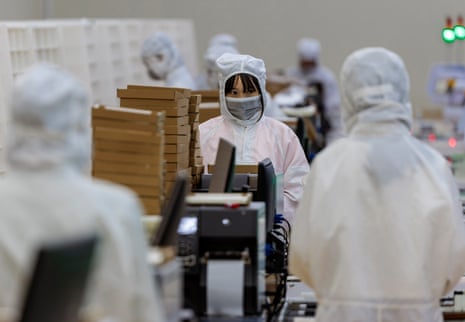UK faces bleak winter ahead as food prices rocket
UK households face a ‘bleak winter’ as prices in the shops continue to accelerate, driven by food.
Food inflation has surged to a new record, with prices jumping by 12.4% over the last 12 months.
Items such as eggs, meat, dairy products and coffee shot up, according to the latest data from the British Retail Consortium (BRC). This lifted fresh food inflation to 14.3%, up from 13.3% last month.
These soaring prices are a heavy blow to shoppers in the run-up to Christmas, particularly poorer households, on top of higher energy bills and falling real wages.

Overall shop prices are now 7.4% higher than last November, up from 6.6% in October, the highest since the BRC started crunching its numbers in 2005.
Helen Dickinson OBE, CEO of the BRC, warns that Christmas will be pricier this year too.
“Winter looks increasingly bleak as pressures on prices continue unabated. Food prices have continued to soar, especially for meat, eggs and dairy, which have been hit by rocketing energy costs, and rising costs of animal feed and transport.
Coffee prices also shot up on last month as high input costs filtered through to price tags. Christmas gifting is also set to become more expensive than in previous years, with sports and recreation equipment seeing particularly high increases.
Rising inflation means the UK is expected to suffer its worst fall in living standards since at least the 1950s.
Dickinson predicts that many households will cut back on seasonal spending in order to prioritise the essentials.
Retailers continue to do all they can to support their customers and ensure everyone can enjoy the festive season by fixing prices of many essentials, offering discounts to vulnerable groups, raising pay for their own people, and expanding their value ranges.”
Here’s the full story:
Key events
Filters BETA
Inflation in France remains at a record high, but lower than in the UK thanks to a cap on French energy bills.
Consumer prices in the eurozone’s second-largest member rose by 7.1% per year this month, the same as October, dashing hopes of a small fall.
Analysts had expected French CPI would fall to 7%.
Even so, that’s lower than in the UK where prices jumped by 11.1% over the year to October.
French families were protected from the surge in gas and electricity prices this year, because president Macron set a 4% cap on price rises at state-owned EDF.
🇫🇷 French inflation unchanged in November (7.1% HICP and 6.2% CPI) as energy remained high (18.5%) and food inflation picked up (12.2%).
But services inflation seems to have turned, down to 3% in November. pic.twitter.com/Sqss06OswC— Frederik Ducrozet (@fwred) November 30, 2022
Ofgem proposes new price controls for local electricity networks
The operators of Britain’s local energy networks will be forced to spend more of their profits on investing to future-proof the country’s electricity grid, as Ofgem said it would not allow any rises in customer bills.
In a new set of price controls which will run from 2023 to 2028, the regulator said that it would keep costs to consumers at around £100 per year. This is no change from today.
Ofgem is pushing those networks to develop cheaper and cleaner local grids at no extra cost to consumers, by investing to support the move away from imported fossil fuels,
To do this companies will have to invest a larger portion of their profits and slash operating costs.
The companies impacted include Scottish and Southern Electricity Networks, Northern Powergrid, SP Energy Networks, Electricity North West, National Grid and UK Power Networks.
Finland on brink of recession
Just in: Finland has suffered a deeper-than-expected contraction as rising inflation hit its economy.
Finland’s GDP shrank by 0.3% in the July-September quarter, new data shows, which ends a five-quarter run of growth
Private spending fell, as Europe’s cost of living squeeze hit households.
Finland is now on the brink of recession, as Timo Hirvonen, Helsinki-based chief economist at Svenska Handelsbanken AB, said on Twitter.
“We expect to see a contraction also in the fourth quarter, which would technically mean a recession for the Finnish economy,”
BKT:n volyymi pieneni Suomessa kuluvan vuoden kolmannella neljänneksessä 0,3 % edellisestä neljänneksestä mutta kasvoi 1,0 % vuodentakaisesta. Odotamme, että BKT:n volyymi pienenee myös neljännellä neljänneksellä ja Suomen talous on tällöin teknisessä taantumassa. pic.twitter.com/0HAOAJhASn
— Timo Hirvonen (@HirvonenTimo) November 30, 2022
Clampdown on international students could hurt university credit ratings

Richard Adams
A UK government clampdown on international student visas would have a negative effect on the financial standing of British universities, according to the credit rating agency Moody’s.
Zoe Jankel, a senior analyst at Moody’s, said:
“If implemented, the policy would be credit negative for the UK university sector because of a drop in revenues and margins due to international students paying much higher fees than domestic students.”
Moody’s said universities with high international rankings such as Oxford “would likely fall outside the scope of the restrictions, however, because of their strong market positions thanks to their ability to attract consistently high demand from students and research funding”, our education editor Richard Adams reports.
However, Moody’s picked out Keele University and De Montfort University in Leicester as vulnerable to changes in policy, saying they…
“would be more exposed, particularly De Montfort University because of its higher reliance on international tuition fees, which accounted for 25% of its total income in fiscal 2021.”
[Last week, Downing Street said that prime minister Rishi Sunak was considering curbs on foreign students taking “low quality” degrees (which they didn’t define) and restricting visas for students’ dependants.]
Moody’s said the University of Manchester and University College London were the most dependent on revenue from international students, bringing in 32% and 31% of their total income in 2020-21, but added:
“Their excellent market positions, however, mean they are unlikely to be the targets of the government’s proposal.”
Moody’s also noted universities were under pressure from the freezing of domestic tuition fees in England since 2017 and higher staff costs, as well as rising inflation that “may reduce already slim operating margins”.
Poorer students over £1,000 worse off this year, warns IFS

Sally Weale
England’s poorest students will be more than £1,000 worse off this academic year than the last, due to soaring inflation.
New analysis has warned that many students face “significant hardship” this winter, because prices have been rising faster than expected.
According to the Institute for Fiscal Studies (IFS), the reduction – which means students from the poorest families will be £125 out of pocket each month – is due to the falling value of maintenance loans, which students take out to cover their living costs.
The problem – maintenance loans are adjusted in line with inflation forecasts rather than inflation itself, which has been much higher than expected this year.
Here’s the full story, by our education correspondent Sally Weale.
UK businesses confidence drops as outlook darkens
UK businesses confidence has weakened, as bosses fear a looming recession as inflation continues to grip the economy.
The Confederation of British Industry reports that optimism fell across the services sector for the third consecutive quarter, with business and professional services firms particularly gloomy.
With costs soaring, company profits are being hit, they say.
Charlotte Dendy, head of economic surveys at the CBI ,said firms also want to see more pro-growth policies from the government:
“Strong cost and price pressures are continuing to hurt services firms, damaging optimism and investment intentions and hitting profitability.
“While firms welcomed aspects of the Autumn Statement, the sector is looking for longer-term measures from Government to spur business investment and bolster confidence into 2023 and beyond. In particular, firms want Government to focus on growth by fighting inflation and the recession together.
A separate survey from Lloyds Bank found that business confidence is now the lowest since February 2021.
UK businesses confidence dropped in two separate surveys, reflecting a darkening economic outlook marked by recession and persistent inflation https://t.co/Tg8WVZBQtH
— Bloomberg (@business) November 30, 2022
Soaring food prices unfairly hit poorest hardest
Soaring food prices hit the poorest hardest, as they spend a greater proportion of their income on essentials such as food and energy.
They could also spur the Bank of England to raise interest rates again, at its next meeting in mid-December.
That would be another blow to many households, pushing up the cost of credit and ther borrowing, as the BoE tries to squeeze out inflationary pressures.
Victoria Scholar, head of investment at interactive investor, tells us:
The BRC-Nielsen IQ Shop Price Index points to record highs all round as rising costs across the board from wages to energy and agriculture are being passed on to consumers in terms of higher prices, especially for meat, eggs, and dairy.
Increasing essential food prices are adding to the cost-of-living crisis, unfairly impacting those at the lower at of the income spectrum more acutely.
Families will be forced to make tough spending choices this festive season, with many opting for a slimmed down version of Christmas this year.
The Bank of England continues its combat against inflation, with another hike expected at its next meeting in December as the central bank desperately attempts to slow the rising cost of living.”
With food prices rising so fast, the cost of Christmas will be higher this year.
Mike Watkins, Head of Retailer and Business Insight at NielsenIQ, says:
Shoppers will be managing their budgets more closely than at any time since the start of cost-of-living crisis.
Retailers are now responding by offering seasonal savings and price cuts and will be hopeful of an uptick in shopper spend as we move into December.”
Earlier this week, a survey commissioned by the Salvation Army found that older people are particularly worried about paying for Christmas dinner.
Some 16% of households are planning to use a food bank to get items for their festive meal, while 38% are likely to skip meals if they have an unexpected expense such as a broken boiler.
The Salvation Army’s Lieutenant Colonel Dean Pallant said:
“Christmas should be the season of joy, not sorrow.
“If so many people are worried they can’t even afford one of the most important meals of the year, it’s a red flag that poverty is creeping further into our communities.”
UK faces bleak winter ahead as food prices rocket
UK households face a ‘bleak winter’ as prices in the shops continue to accelerate, driven by food.
Food inflation has surged to a new record, with prices jumping by 12.4% over the last 12 months.
Items such as eggs, meat, dairy products and coffee shot up, according to the latest data from the British Retail Consortium (BRC). This lifted fresh food inflation to 14.3%, up from 13.3% last month.
These soaring prices are a heavy blow to shoppers in the run-up to Christmas, particularly poorer households, on top of higher energy bills and falling real wages.

Overall shop prices are now 7.4% higher than last November, up from 6.6% in October, the highest since the BRC started crunching its numbers in 2005.
Helen Dickinson OBE, CEO of the BRC, warns that Christmas will be pricier this year too.
“Winter looks increasingly bleak as pressures on prices continue unabated. Food prices have continued to soar, especially for meat, eggs and dairy, which have been hit by rocketing energy costs, and rising costs of animal feed and transport.
Coffee prices also shot up on last month as high input costs filtered through to price tags. Christmas gifting is also set to become more expensive than in previous years, with sports and recreation equipment seeing particularly high increases.
Rising inflation means the UK is expected to suffer its worst fall in living standards since at least the 1950s.
Dickinson predicts that many households will cut back on seasonal spending in order to prioritise the essentials.
Retailers continue to do all they can to support their customers and ensure everyone can enjoy the festive season by fixing prices of many essentials, offering discounts to vulnerable groups, raising pay for their own people, and expanding their value ranges.”
Here’s the full story:
Introduction: China PMIs hit seven-month low as economy weakens

Good morning, and welcome to our rolling coverage of business, the financial markets and the world economy.
Today we have fresh evidence that China’s economy is struggling, as strict COVID-19 restrictions and rising infections drag growth down.
Activity at China’s manufacturing and services companies shrank again this month, at the fastest pace in seven months. Output, employment and delivery times all weakened, while measures of new orders, and new export demand, also fell further.
The official manufacturing purchasing managers’ index (PMI) fell to 48.0 for November against 49.2 in the previous month, the lowest reading since April.
The non-manufacturing PMI, which tracks service sector activity, fell to 46.7 from 48.7 in October. Any reading below 50 shows a contraction.
China’s manufacturing and non-manufacturing activities both slip deeper into contraction in Nov.
Manufacturing PMI at 48
Non-manufacturing PMI at 46.7 pic.twitter.com/afbmZSPAdD— Cathy Yuan Zhang (@CathyYuanZhang) November 30, 2022
Economists fear China’s economy will struggle next year, with policymakers sticking to their zero-Covid strategy despite protests on the streets last weekend.
Sheana Yue, China economist at Capital Economics, warned that China’s economy may struggle for months:
“Downside risks continue to grow as the virus situation continues to worsen and will weigh heavily on the economy into 2023.”
As we covered yesterday, several carmakers have cut production due to the clampdown on the virus. Apple could miss out on production of as many as 6 million units of its premium iPhone 14 Pro models this quarter, due to disruption at Foxconn’s Zhengzhou plans.
Stephen Innes, managing partner at SPI Asset Management, agrees that the first half of 2023 will be weak:
The activity data continues to cement the view that the Chinese economy is expected to display a distinct “two halves” next year, where a brutal winter will likely continue to weaken economic data in December and the first quarter following.
Still, it will give way to above-consensus growth in H2 as the economy reopens.
Also coming up today.
We’ll hear from the Bank of England’s chief economist, Huw Pill, when he speaks at a conference organised by the Institute of Chartered Accountants in England and Wales.
Yesterday, BoE governor Andrew Bailey revealed the Bank had been left in the dark about Kwasi Kwarteng’s disastrous mini-budget, describing an “extraordinary process” with “no formal communication” in advance between the central bank and the Treasury.
European markets are set to open higher, ahead of the flash eurozone inflation report for this month. It may show that inflationary pressures are peaking.
We also find out how many workers were hired by US companies last month, how many vacancies are unfilled, and how India’s economy fared in the last quarter.
The agenda:
-
7.45am GMT: France’s inflation report for November
-
8.30am GMT: Bank of England chief economist Huw Pill speaks at a conference of the Institute of Chartered Accountants of England and Wales (ICAEW)
-
8.55am GMT: German unemployment report
-
10am GMT: Eurozone flash inflation report for November
-
Noon GMT: India’s Q3 GDP report
-
Noon GMT: US weekly mortgage applications
-
1.15pm GMT: ADP survey of US company payrolls in November
-
1.30pm GMT: US Q3 GDP report (second estimate)
-
3pm GMT: JOLTS survey of US jobs openings


